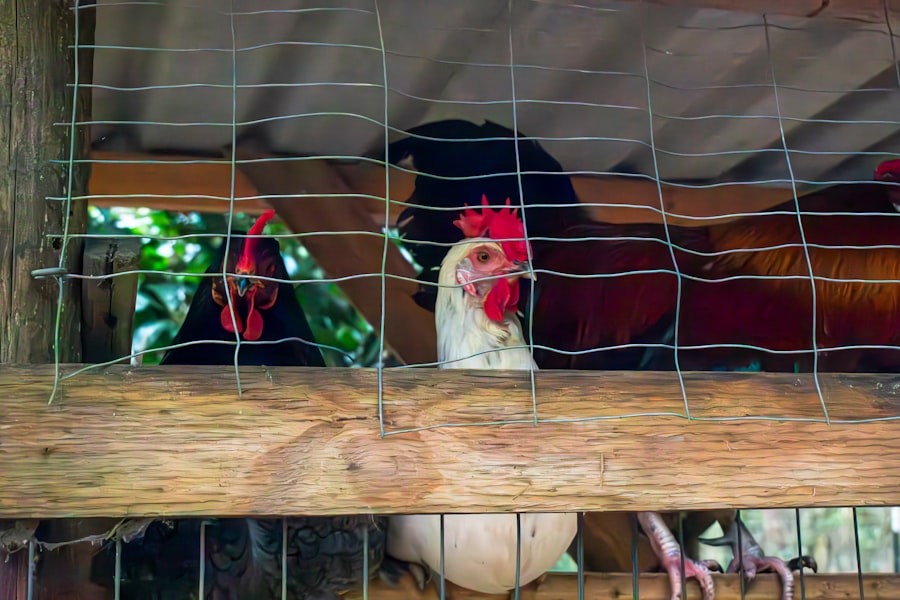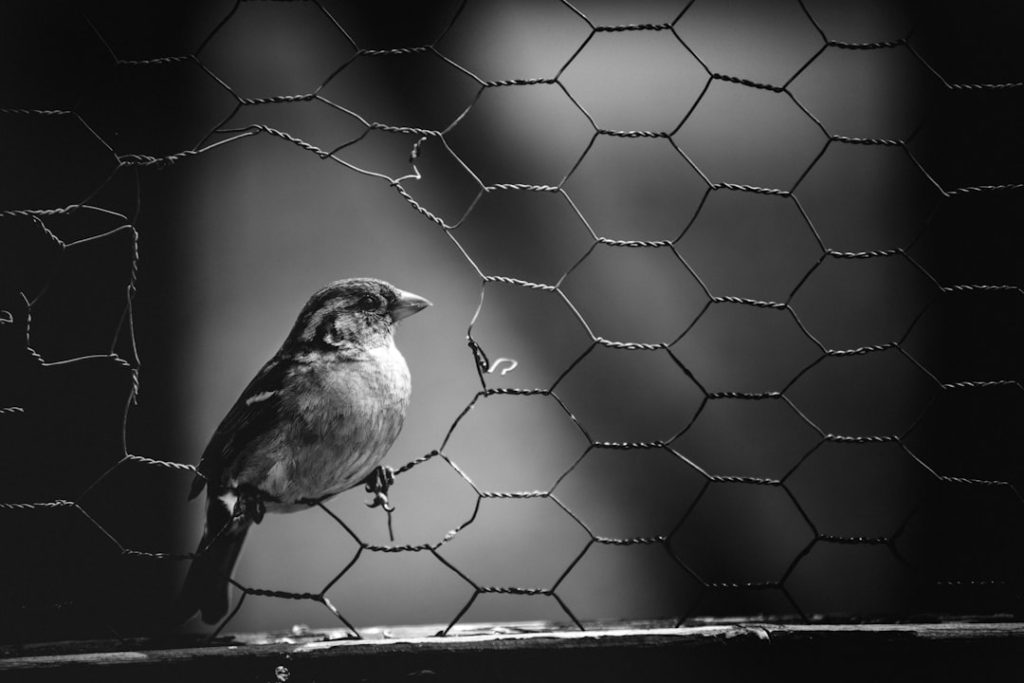Chickens are naturally curious and inquisitive creatures, often drawn to areas with abundant food sources and open spaces. They exhibit territorial behavior and will defend their chosen foraging grounds. Understanding these behaviors is essential for effectively deterring chickens from entering unwanted areas such as gardens.
Chickens are easily startled, which can be advantageous when implementing scare tactics. They also have a strong sense of hierarchy within their flock, which can be leveraged when training them to avoid certain areas. Chickens are creatures of habit and can be trained to avoid specific areas through consistent reinforcement.
By understanding their natural behaviors, effective strategies can be developed to keep them out of gardens and other unwanted areas. It is important to approach the issue with consideration for the chickens’ natural instincts while also protecting desired spaces. As social animals, chickens thrive in groups and have a natural instinct to forage for food.
Their territorial nature and tendency to defend their foraging grounds must be taken into account when developing deterrent strategies. The chickens’ easily startled nature and strong sense of flock hierarchy can be utilized in training efforts to keep them out of specific areas.
Table of Contents
- 1 Creating physical barriers to deter chickens
- 2 Using natural deterrents to keep chickens away
- 3 Implementing scare tactics to discourage chickens
- 4 Providing alternative areas for chickens to forage
- 5 Training chickens to stay out of the garden
- 6 Working with neighbors to address roaming chickens
- 7 FAQs
- 7.1 What are some effective ways to keep chickens out of the garden?
- 7.2 What type of fencing is best for keeping chickens out of the garden?
- 7.3 What are some examples of physical barriers to keep chickens out of the garden?
- 7.4 What types of repellents can be used to keep chickens out of the garden?
- 7.5 How can providing alternative foraging areas help keep chickens out of the garden?
Key Takeaways
- Chickens are naturally curious and will forage for food, so understanding their behavior is key to deterring them from specific areas.
- Creating physical barriers such as fences or netting can effectively keep chickens out of gardens or other restricted areas.
- Natural deterrents like citrus peels, coffee grounds, or cayenne pepper can be used to discourage chickens from entering certain spaces.
- Scare tactics like motion-activated sprinklers or noise-making devices can startle chickens and discourage them from returning to an area.
- Providing alternative areas for chickens to forage, such as a designated feeding area, can redirect their attention away from gardens or other off-limits spaces.
- Training chickens to stay out of the garden can be achieved through consistent reinforcement and positive/negative reinforcement techniques.
- Working with neighbors to address roaming chickens can involve setting boundaries and collaborating on solutions to keep chickens from causing disturbances in shared spaces.
Creating physical barriers to deter chickens
Installing Physical Barriers
One effective way to keep chickens out of gardens and other areas is by creating physical barriers that prevent their access. This can include installing fences or netting around the perimeter of the garden to keep chickens from entering. It is important to ensure that the barriers are tall enough to prevent the chickens from flying over them, as chickens are capable of limited flight.
Securing the Barriers
Additionally, burying the bottom of the fence or netting underground can prevent chickens from digging underneath to gain access. Another physical barrier that can be effective in deterring chickens is the use of chicken wire or hardware cloth. These materials can be placed over garden beds or around plants to prevent chickens from scratching and pecking at the soil. It is important to secure the wire or cloth firmly in place to prevent the chickens from moving it aside.
Raised Garden Beds and Understanding Chicken Behavior
Using raised garden beds can make it more difficult for chickens to access the plants, as they are less likely to jump onto elevated surfaces. Creating physical barriers is an effective way to deter chickens from entering unwanted areas such as gardens. By understanding the natural behaviors of chickens, we can develop physical barriers that effectively prevent their access while still allowing them to roam freely in other areas.
Using natural deterrents to keep chickens away

In addition to physical barriers, natural deterrents can also be used to keep chickens away from gardens and other unwanted areas. One effective natural deterrent is the use of strong-smelling plants such as lavender, mint, or marigolds. Chickens are known to dislike strong scents, and planting these types of herbs and flowers around the perimeter of the garden can help deter them from entering.
Additionally, spreading citrus peels or coffee grounds around the garden can also help repel chickens due to their strong odors. Another natural deterrent that can be effective in keeping chickens away is the use of motion-activated sprinklers or noise-making devices. These can startle the chickens when they approach the garden, causing them to retreat.
Additionally, using reflective surfaces such as old CDs or aluminum foil around the garden can create flashes of light that deter chickens from entering. Using natural deterrents is a humane and environmentally friendly way to keep chickens out of gardens and other unwanted areas. By leveraging the natural aversions of chickens to certain scents and stimuli, we can effectively deter them from entering without causing harm.
Implementing scare tactics to discourage chickens
Scare tactics can be an effective way to discourage chickens from entering gardens and other unwanted areas. One common scare tactic is the use of scarecrows, which can be placed strategically around the garden to deter chickens. It is important to move the scarecrows periodically to prevent the chickens from becoming accustomed to their presence.
Another scare tactic that can be effective in deterring chickens is the use of loud noises or sudden movements. This can be achieved by using motion-activated noise-making devices or by clapping hands or using a whistle when chickens approach the garden. The sudden noise or movement can startle the chickens and cause them to retreat.
Additionally, using visual deterrents such as predator decoys or fake predators can also be effective in scaring off chickens. Placing fake owls or hawks around the garden can create the illusion of a predator presence, causing the chickens to avoid the area. Implementing scare tactics is a non-harmful way to discourage chickens from entering gardens and other unwanted areas.
By using a combination of scare tactics, we can effectively deter chickens while still allowing them to roam freely in other areas.
Providing alternative areas for chickens to forage
One way to keep chickens out of gardens and other unwanted areas is by providing alternative spaces for them to forage and explore. This can include creating designated foraging areas with loose soil or mulch where chickens can scratch and peck without causing damage to plants. Additionally, providing ample space for chickens to roam freely can help prevent them from seeking out gardens and other restricted areas.
Another way to provide alternative foraging areas for chickens is by offering supplemental food sources such as scratch grains or mealworms in designated feeding areas away from the garden. By ensuring that chickens have access to plenty of food in other areas, they are less likely to seek out gardens as a food source. It is important to provide alternative foraging areas for chickens in order to meet their natural instincts while also protecting our own spaces.
By understanding the needs of chickens and providing them with suitable alternatives, we can effectively deter them from entering gardens and other unwanted areas.
Training chickens to stay out of the garden

Using Treats as Rewards
Chickens can be trained to stay out of gardens and other unwanted areas through consistent reinforcement and positive reinforcement techniques. One effective method is using treats as a reward for staying out of restricted areas. By offering treats in designated foraging areas away from the garden, we can encourage chickens to stay out of restricted spaces.
Verbal Commands and Hand Signals
Another training method is using verbal commands and hand signals to communicate boundaries with the chickens. By consistently using the same commands and signals when directing the chickens away from restricted areas, they can learn to associate these cues with staying out of those spaces.
Key to Successful Training
It is important to approach training with patience and consistency in order to effectively teach chickens to stay out of gardens and other unwanted areas. By using positive reinforcement techniques and clear communication, we can train chickens to respect boundaries while still allowing them to roam freely in other areas.
Working with neighbors to address roaming chickens
If roaming chickens are a common issue in a community, it may be beneficial to work with neighbors to address the problem collectively. This can include discussing potential solutions such as creating shared chicken-proof fencing or establishing designated foraging areas for communal use. Additionally, open communication with neighbors about concerns regarding roaming chickens can help foster understanding and cooperation in finding solutions that work for everyone involved.
By working together, neighbors can develop strategies that effectively address roaming chicken issues while still allowing the animals to roam freely in designated areas. It is important to approach discussions with empathy and understanding for all parties involved in order to find mutually beneficial solutions. By working with neighbors, we can address roaming chicken issues in a way that respects the needs of both the animals and the community as a whole.
If you’re struggling to keep chickens out of your garden, you may want to consider converting a shed into a chicken coop. This can provide a designated space for your chickens to roam and lay eggs, keeping them away from your prized plants. For more information on how to convert a shed into a chicken coop, check out this helpful article on Poultry Wizard’s website: Convert Shed to Chicken Coop.
FAQs
What are some effective ways to keep chickens out of the garden?
Some effective ways to keep chickens out of the garden include using fencing, creating physical barriers, using repellents, and providing alternative areas for the chickens to forage.
What type of fencing is best for keeping chickens out of the garden?
A sturdy wire or mesh fencing that is at least 4 feet tall and buried a few inches into the ground is best for keeping chickens out of the garden. Electric fencing can also be effective.
What are some examples of physical barriers to keep chickens out of the garden?
Physical barriers such as low walls, raised beds, and cloches can be effective in keeping chickens out of the garden. These barriers make it difficult for chickens to access the garden beds.
What types of repellents can be used to keep chickens out of the garden?
Repellents such as motion-activated sprinklers, predator decoys, and strong-smelling plants like lavender or marigolds can be used to deter chickens from entering the garden.
How can providing alternative foraging areas help keep chickens out of the garden?
By providing chickens with alternative foraging areas such as a designated free-range area or a separate chicken run, they are less likely to venture into the garden in search of food. This can help keep them out of the garden.
Meet Walter, the feathered-friend fanatic of Florida! Nestled in the sunshine state, Walter struts through life with his feathered companions, clucking his way to happiness. With a coop that’s fancier than a five-star hotel, he’s the Don Juan of the chicken world. When he’s not teaching his hens to do the cha-cha, you’ll find him in a heated debate with his prized rooster, Sir Clucks-a-Lot. Walter’s poultry passion is no yolk; he’s the sunny-side-up guy you never knew you needed in your flock of friends!







